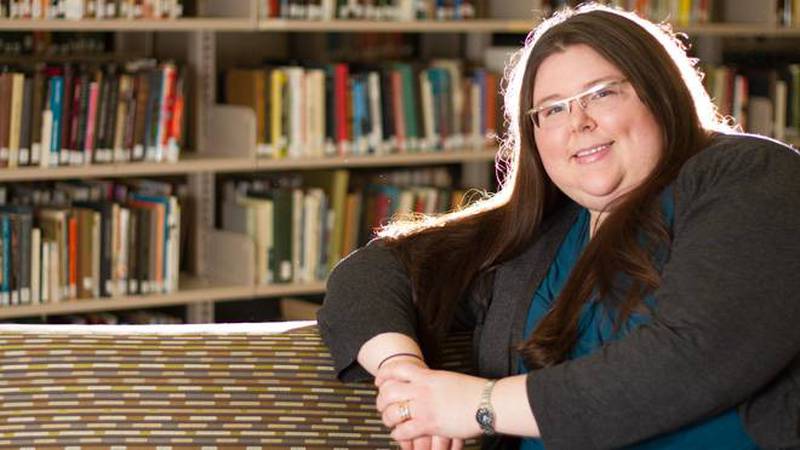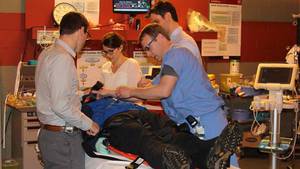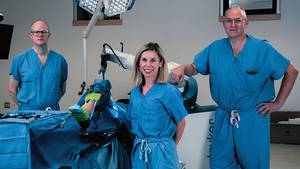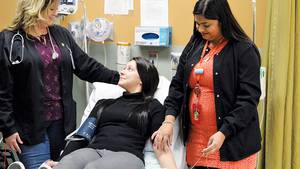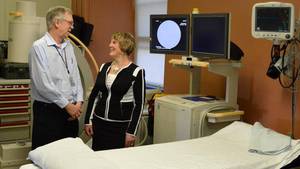Heading to university for the first time can be overwhelming. There’s the transition from the comforting environment of high school to a larger, more competitive academic environment. There’s also the personal responsibility that goes with it – being away from your family, new friends, new experiences, having to deal with laundry and cooking, financial worries, and, for many, the stress of balancing part time jobs to pay tuition.
“I make a list, I’m very list oriented, and I always have to lay out what I need to do. I always prioritize; I go for coffee with friends, take the dog for a walk, and make sure I’m getting enough sleep. You can become so overwhelmed with school work that, in the end, you get less done overall,” says Kristen Zaun, a Mount Saint Vincent University student.
Kristen is in her final year of Child and Youth Studies. She has been balancing living with episodic psychosis, depression and anxiety while completing her degree. This helps her understand the pressure of university for other students living with mental illnesses, and the importance of bringing mental health to the forefront.
“When you talk about mental illness there is a stigma around it, but when you’re already dealing with going to university for the first time, sometimes your mental health may be a side issue. People see mental health issues as embarrassing because you don’t want your professors or peers to judge you when you're already trying to get through the stress of being in university,” says Kristen. “It really changes your life— going from high school to post-secondary education is already difficult, and having a mental illness makes it even harder, but it is important to remember there is always hope, and things do get better.”
The Nova Scotia Early Psychosis Program (NSEPP) of Capital Health is developing a program, Your Mind Matters; to help young people recognize when these various stressors are becoming a problem, and when and where to get help. The goal of the program is to encourage early detection and treatment of mental illness.
“There is a neurodevelopmental theory that states stressors in late adolescence and early adulthood can lead to the development of psychosis in those who are vulnerable. The transition to university offers many potential stressors for the vulnerable person” says Dr. Phil Tibbo, NSEPP Director and staff psychiatrist with the QEII Health Sciences Centre.
He says early detection of mental health issues is no different than detecting physical health issues.
“If you have an odd looking mole, you know to go to your doctor to get it checked out – before it turns into something worse,” he says. “It’s the same for mental health. You want to get help early, whether it’s through medications, talk therapy, or taking time off so that you can recover, so more serious outcomes are prevented or minimized.”
Margie Crown is a registered nurse at the QEII who is working with Dr. Tibbo on this program. Focus groups have been conducted around the province with students, NSEPP patients in recovery and their families, to get information to guide the creation of resources that can be easily accessed by students who feel they, or their friends, are having trouble.
“We’re working with EGG Films to create a menu of resources that will be loaded onto a flash drive,” Crown says. “The individual can take it back home and load it onto their computer. It will have a number of drop-down menus, with information about psychosis, other mental health issues and where to get help. The further down the menu you go, the more detailed the information will be. It’s also going to be presented in short bursts of information, using quizzes, questions and answers, videos featuring young people who have battled mental health issues, and animation, because that’s what our groups told us they wanted. There’s also room on the flash drive for projects they can do.”
There will be a specially designed website for the Your Mind Matters project, stressing how to look after all aspects of health through healthy eating, exercise, time management, and other proactive means of taking personal responsibility for your health.
She says the program and the website will be rolled out in the fall semester in an urban and a rural campus in the province. The target date is around the beginning of midterm season, when first year students are starting to come to grips with these significant changes in their lives.
Kristen believes this project will provide students with the resources they need to put mental health at the forefront and battle the stigma connected to mental illness.
“There is a self-stigma that is almost more critical than the societal stigma around mental health. I think it’s really important that people overcome that by recognizing you are more than your mental illness,” she says. “Stability and recovery, with the right resources, is possible.”

